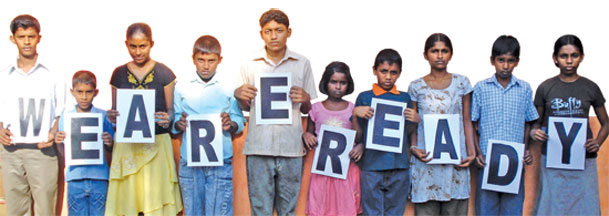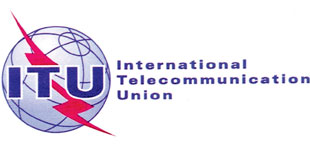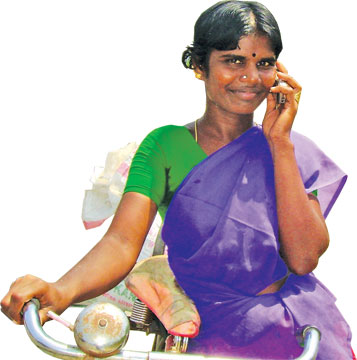Towards a Global Information Society
Bridging the Digital Divide:
By Pramod DE SILVA
 Today, it is not unusual to see people using mobile phones even in
the remotest areas. You can browse the Internet in the most unlikely
places. And if you have an Internet dongle (mobile broadband device),
you can go online from almost anywhere in the world. Today, it is not unusual to see people using mobile phones even in
the remotest areas. You can browse the Internet in the most unlikely
places. And if you have an Internet dongle (mobile broadband device),
you can go online from almost anywhere in the world.
Satellite phones work almost anywhere on the planet. GPS devices can
pinpoint one’s exact location anytime, any place. Thanks to services
such as Skype, we can talk to a person on the other side of the world
free.
Wall-to-wall television or online coverage means we can watch any
event happening anywhere from almost any other place in the world,
instantly. It is indeed a 24/7 connected world!
Sadly, not everyone is part of this global revolution. There are
millions who have never made a telephone call, fixed or mobile. There
are millions who do not know what the Internet is. IPads, Tabs and
laptop computers are just a dream for these people. In other words,
there is a vast ‘Digital Divide’ which has to be bridged.
The world still has a long way to go before this gap is bridged.
The International Telecommunications Union (ITU), of which nearly all
UN countries are members, has long championed equal access to telecom
facilities for all. Its ultimate goal is to have an ‘Information
Society’ and towards this end, it has designated a special day to
reflect on these issues.
 The purpose of the World Telecommunication and Information Society
Day, which fell on May 17, is to help raise awareness of the
possibilities that the use of the Internet and other Information and
Communication Technologies (ICT) can bring to societies and economies,
as well as ways to bridge the digital divide. The purpose of the World Telecommunication and Information Society
Day, which fell on May 17, is to help raise awareness of the
possibilities that the use of the Internet and other Information and
Communication Technologies (ICT) can bring to societies and economies,
as well as ways to bridge the digital divide.
But why May 17? It marks the anniversary of the signing of the first
International Telegraph Convention and the creation of the International
Telecommunication Union. The World Telecommunication Day has been
celebrated annually on May 17 since 1969.
Rise of Internet
By the early part of the 21st century, the ITU realised that a
telecom day alone was not enough and that it had to take the rapid rise
of the Internet into account. In November 2005, the World Summit on the
Information Society called upon the United Nations General Assembly to
declare May 17 as World Information Society Day to focus on the
importance of ICT and the wide range of issues related to the
Information Society.
The General Assembly adopted a resolution stipulating that World
Information Society Day shall be celebrated every year on May 17.
This decision was taken in November 2006 at the ITU Plenipotentiary
Conference in Antalya, Turkey. Thus May 17 now marks the twin World
Telecommunication and Information Society Day.
The ITU has noted that ICTs are “Constantly reshaping the way the
world communicates while creating opportunities for a better life
through long-term, sustainable development, not least among the most
disadvantaged sections of our society”.
This year’s theme “Better life in rural communities with ICTs”, which
was adopted in 2009 follows up on the theme for 2010: “Better city,
better life with ICTs”. While cities have made rapid progress in terms
of telephony and Internet penetration, the picture is not so rosy when
it comes to rural areas. Hence, the significance of this year’s theme.
Better telecom facilities do indeed lead to better lives.
Information technologies are important for the rural sector because
they provide enhanced opportunities to generate income and combat
poverty, hunger, ill health and illiteracy.
ICTs and related e-applications are key instruments in improving
governance and rural services, such as providing community health care,
safe drinking water and sanitation, education, food and shelter;
improving maternal health and reducing child mortality; empowering women
and the more vulnerable members of society; and ensuring environmental
sustainability.
As ITU Secretary General Hamadoun I. Toure points out, half the
world’s population - nearly 3.5 billion people - resides in rural
districts and far flung communities, representing the poorer, less
educated, and more deprived cousins of the world’s urban citizens.
Extremely poor
Among them are 1.4 billion of the world’s extremely poor people, who
are also among the least connected to the benefits of ICTs. Their lives
can be transformed as villages are connected to information and
knowledge on the Internet - telemedicine is introduced to far-flung
rural health centres and accurate weather information is made available
to farmers and fishermen, to give a few examples.
Toure has called for global action to connect rural communities to
the opportunities offered by ICTs.
Mobile phone penetration has already surpassed expectations - Sri
Lanka alone has nearly 17 million subscribers, which is extremely good
for a country with a population of 21 million. Globally, there are
around five billion mobile subscribers.
However, broadband penetration for Internet access (mobile and fixed)
is rather poor in most countries including Sri Lanka.
These countries do have an opportunity to leapfrog to newer
technologies such as Long Term Evolution or 4G demonstrated in Colombo
recently. Ensuring broadband access is one major issue that the ITU and
individual governments have to address swiftly.
Fast broadband connectivity is essential to establish the information
and communication highway that will IT-enable both urban centres and
rural communities. Broadband telecommunications will make it possible to
drive content to the remotest districts.
The ITU’s Broadband Initiative is aimed at increasing the roll-out of
this state-of-the-art technology.
The World Summit on the Information Society, which met in Geneva in
2003 and in Tunis in 2005, called upon countries to consider
establishing national mechanisms to achieve universal access in rural
areas to bridge the digital divide.
Recent events
UN Secretary-General Ban Ki-moon in his message for the World
Information Society Day highlighted how ICT technologies are literally
changing the world. “Recent events around the world, in particular in
North Africa and the Middle East, have also highlighted the catalytic
role that mobile phones and social media can play in galvanising public
opinion. And in the aftermath of natural disasters that have struck with
greater frequency and force, we have seen how these technologies are a
vital part of the aid response, establishing lines of communication that
can save lives, reunite families and help emergency relief reach people
in need.”
 Yes, however, unthinkable it may be, Internet innovations such as
Facebook and Twitter help get the message across, really fast. And
thanks to the convergence of the Internet and mobile phone technologies,
they are available to us 24/7. Yes, however, unthinkable it may be, Internet innovations such as
Facebook and Twitter help get the message across, really fast. And
thanks to the convergence of the Internet and mobile phone technologies,
they are available to us 24/7.
Mobile devices
It is through mobile devices that the Internet could best penetrate
rural areas, because even highly advanced mobile phones (smartphones)
are getting cheaper. Moreover, a message such as a tsunami alert
broadcast through an SMS has a much higher chance of reaching everyone
in the vulnerable areas rather than a radio or TV broadcast, because the
phone is with the subscriber all the time.
Both Internet and telecom technologies are evolving and developing at
a rapid pace.
It is difficult to predict what the telecom landscape will be like
even five years from now. This is an exciting challenge and an
opportunity.
The international community should strive to make this technology
available to the widest possible population, including the poorer
segments of society in the least developed nations. That will create a
true Information Society. |

